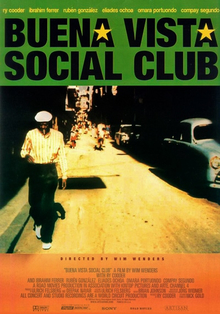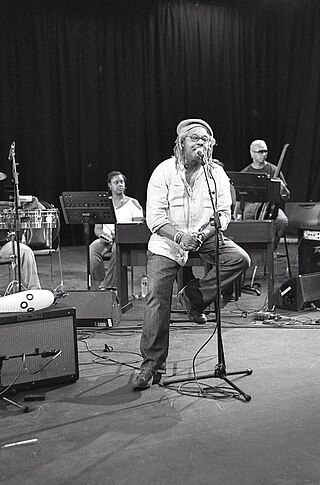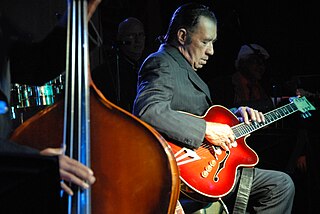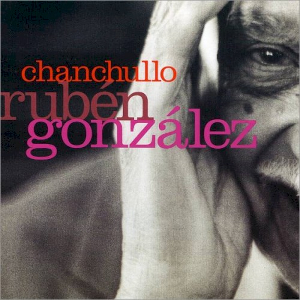
Máximo Francisco Repilado Muñoz Telles, known professionally as "Compay Segundo", was a Cuban trova guitarist, singer and composer.

Buena Vista Social Club is a 1999 documentary film directed by Wim Wenders about the music of Cuba. It is named for a danzón that became the title piece of the album Buena Vista Social Club. The film is an international co-production of Germany, the United States, the United Kingdom, France, and Cuba.

Rubén González Fontanills was a Cuban pianist. Together with Lilí Martínez and Peruchín he is said to have "forged the style of modern Cuban piano playing in the 1940s".

Buena Vista Social Club was a musical ensemble primarily made up of Cuban musicians, formed in 1996. The project was organized by World Circuit executive Nick Gold, produced by American guitarist Ry Cooder and directed by Juan de Marcos González. They named the group after the members' club of the same name in the Buenavista quarter of Havana, a popular music venue in the 1940s. To showcase the popular styles of the time, such as son, bolero and danzón, they recruited a dozen veteran musicians, some of whom had been retired for many years.

Afro-Cuban All Stars is a Cuban band led by Juan de Marcos González. Their music is a mix of all the styles of Cuban music, including bolero, chachachá, salsa, son montuno, timba, guajira, danzón, rumba and abakua.

Buena Vista Social Club is a studio album by Buena Vista Social Club, an ensemble of Cuban musicians directed by Juan de Marcos González and American guitarist Ry Cooder. Produced by Cooder, it was recorded at Havana's EGREM studios in March 1996 and released on September 16, 1997, through World Circuit internationally and Nonesuch Records in the United States. It is the only standard studio album exclusively credited to the Buena Vista Social Club.
A descarga is an improvised jam session consisting of variations on Cuban music themes, primarily son montuno, but also guajira, bolero, guaracha and rumba. The genre is strongly influenced by jazz and it was developed in Havana during the 1950s. Important figures in the emergence of the genre were Cachao, Julio Gutiérrez, Bebo Valdés, Peruchín and Niño Rivera in Cuba, and Tito Puente, Machito and Mario Bauzá in New York. Originally, descargas were promoted by record companies such as Panart, Maype and Gema under the label Cuban jam sessions. From the 1960s, the descarga format was usually adapted by large salsa ensembles, most notably the Fania All-Stars.

Israel López Valdés, better known as Cachao, was a Cuban double bassist and composer. Cachao is widely known as the co-creator of the mambo and a master of the descarga. Throughout his career he also performed and recorded in a variety of music styles ranging from classical music to salsa. An exile in the United States since the 1960s, he only achieved international fame following a career revival in the 1990s.

World Circuit is a British world-music record label, established in London in the mid-1980s, that specializes in Cuban and West African recording artists, among other international music stars. The label's founding principle was to be an artist-led company with all aspects of each release tailored to the artist. This continues to be the label's way of working. World Circuit celebrated its 20th anniversary in 2006 by releasing World Circuit Presents..., a 2-disc retrospective compilation album. In 2018, World Circuit was acquired by BMG Rights Management.
Orestes López Valdés, nicknamed Macho, was a Cuban multi-instrumentalist, composer and bandleader. As a double bassist he was a founding member of the Havana Philharmonic Orchestra, and later a member of the National Symphony Orchestra of Cuba. A long-time member of the charanga Arcaño y sus Maravillas, where he played cello and piano, he is considered the co-creator of the mambo, together with his brother Israel "Cachao" López, and one of the most prolific danzón composers of the 20th century.

Roberto Fonseca is a Cuban jazz pianist. From an early age, Fonseca was surrounded by music: his father was drum player Roberto Fonseca, Sr, his mother, Mercedes Cortes Alfaro, a professional singer, and his two older half-brothers from his mother's previous marriage to the pianist and musician Jesús "Chucho" Valdés are Emilio Valdés (drums) and Jesús "Chuchito" Valdés Jr. (piano).

Manuel Galbán was a Grammy-winning Cuban guitarist, pianist and arranger, most notable for his work with Los Zafiros, Ry Cooder and the Buena Vista Social Club. He died on July 7, 2011, of cardiac arrest at his home in Havana, Cuba.
Pedro Nolasco Jústiz Rodríguez, better known as Peruchín, was a Cuban pianist specializing in jazz-influenced Cuban popular music. He was an important figure in the 1950s descarga scene in Havana, and one of the most influential Cuban pianists of the 20th century.

A Toda Cuba le Gusta is the first studio album by the Afro-Cuban All Stars, produced by Cuban bandleader and musician Juan de Marcos González and Nick Gold, and released on April 9, 1997 on World Circuit Records.

Chanchullo is a studio album by Cuban pianist Rubén González. It was recorded over the course of three years under the direction of trombonist Jesús "Aguaje" Ramos, and released on September 19, 2000, through World Circuit.
Enrique Raúl Planas Fernández was a popular Cuban singer and songwriter. He performed and recorded with many bands and musicians, including Carlos Barbería y su Orquesta Kubavana, Sonora Matancera, Celia Cruz, Conjunto Rumbavana, Conjunto Chappottín, Charanga Rubalcaba, Rubén González, and the Afro-Cuban All Stars.
Juana Coralia López Valdés was a Cuban pianist, bandleader and composer. Between 1940 and 1956 she directed her own charanga danzonera, being the first woman to direct any such orchestra in Cuba. During her career she composed many popular danzones such as "Llegó Manolo", "El bajo que come chivo", "Los jóvenes del agua fria" and the famous "Isora Club", which became a standard in the Latin music repertoire.
"Social Club Buenavista" is a danzón composed by Cuban bassist Israel López "Cachao". It is one of his many compositions dedicated to a Cuban venue where he frequently played as part of the charanga Arcaño y sus Maravillas. It has become a standard of the genre, being regularly performed by artists such as Frank Emilio Flynn and Rubén González throughout the 20th century. Although composed during the 1940s, it was first recorded in 1958 by Cachao himself, along with several former members of las Maravillas, for the album El Gran Cachao, released by Kubaney.

Arcaño y sus Maravillas was a Cuban charanga founded in 1937 by flautist Antonio Arcaño. Until its dissolution in 1958, it was one of the most popular and prolific danzón orchestras in Cuba, particularly due to the development of the danzón-mambo by its two main composers and musicians: Orestes López and his brother Israel López "Cachao" (bass). Such upbeat version of the danzón served as a precursor of the mambo popularized by Pérez Prado, as well as the chachachá created by Enrique Jorrín, a violinist who started his career in the Maravillas. Other important musicians in the Maravillas were pianist Jesús López, timbalero Ulpiano Díaz, violinist Félix Reina and flautist Eulogio Ortiz.
Pedro Celestino Depestre González was a Cuban violinist, arranger and musical director. He was one of Cuba's most prolific charanga violinists, playing with Orquesta Aragón, Orquesta Maravillas de Florida, Orquesta Típica Juventud and Estrellas de Areito, among others. In the late 1990s, he recorded with the Buena Vista Social Club ensemble and toured with Orlando "Cachaíto" López in 2001, but died on stage during the first concert of the tour.













